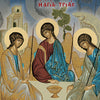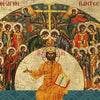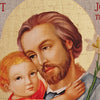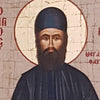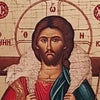The Twelve Days of Christmas

The celebration of the birth of Christ, his baptism and all the related events take place during the period that starts on Christmas Eve and comes to a close on the Eve of Epiphany, January 5. In the Christian tradition, these are the twelve days of Christmas.
The first Christian church had designated January 6 as the celebration day of the birth and baptism of Jesus Christ. In the early 4th century, the heads of the church decided to distinguish one celebration from the other and determined December 25 as the celebration day of Christ’s birth while keeping January 6 and the celebration day of his baptism.
It also seems that choosing December 25 solved another problem. The last ten days of December were filled with pagan gatherings and celebrations, like the celebration of the sun god and his dominance over the god of darkness as the days gradually start getting longer (winter solstice). The early Christians seemed swayed by such temptations and so the fathers of the church wanted to provide them with their own reason for celebration, which they found in the Birth of the Son of God (the Maker of the sun).
Today the Greek Orthodox Church festively and joyfully celebrates the Christmas holidays. Christmas Day signals the start of the holiday masses, while January 6, also called “Little Christmas” brings it to a close. The Twelve Days of Christmas include: the pilgrimage of the shepherds to the Grotto of the Nativity in Bethlehem and the arrival of the three Magi on the day of his Birth; the motherhood of the Virgin Mary on the day after Christmas, when she receives congratulations and well wishes for the Divine Infant; the feast day of Saint Stephen, the first martyr and archdeacon on December 27; the Massacre of the Innocents, the memorial of the death of 14,000 infants by decree of Herod, King of Judea, on December 29; the Afterfeast of Christmas when mention is made of the flesh birth of the Lord on December 31; the circumcision of Christ on January 1 along with the Feast Day of Saint Basil; the pre-celebrations of Epiphany on January 2 ; the Synaxis of the Seventy Apostles on January 4; the day after, January 5, is a day of strict fasting as it is the Eve of Epiphany, on which a mass similar to that of Christmas Eve is held.

